Breaking Down the Culture of Animal Cruelty in Belize
Animal cruelty has been a major concern for Belizeans across the country. Recently, we’ve covered stories about neglected and abused horses and dogs being shot by police officers. But animal cruelty takes many forms and happens around us every day. In tonight’s edition of the Five-Point Breakdown, we examine the culture of animal cruelty in Belize and the laws that protect animals. News Five’s Britney Gordon reports.
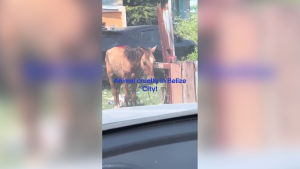 Britney Gordon, Reporting
Britney Gordon, Reporting
Less than a week ago, a shocking video showing a brutal attack on a horse with a machete went viral, causing widespread concern across the country. Following the incident, five people, including three minors, were charged with animal cruelty. Unfortunately, this isn’t the first time such a crime has happened in Belize. Just this past January, a police officer was charged after a video of him repeatedly beating a dog circulated on social media. Animal cruelty occurs every day, but it’s rarely caught on camera or reported.
What is Animal cruelty?
 Britney Gordon
Britney Gordon
Belize’s Cruelty to Animals Act outlines penalties for any person who refuses or neglects to provide and supply animals in their care with food and water, and any person who cruelly beats, ill-treats, over-drives, over-loads, or tortures animals. It even makes provisions for those mishandling animals or engaging in animal fighting, but what are these penalties?
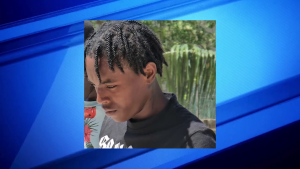 The law allows police officers to arrest anyone violating its provisions without needing any other authority or warrant, so offenders can be brought before a magistrate and dealt with according to the law. Recently, Police Commissioner Chester Williams prosecuted the case against the five men accused of injuring the horse.
The law allows police officers to arrest anyone violating its provisions without needing any other authority or warrant, so offenders can be brought before a magistrate and dealt with according to the law. Recently, Police Commissioner Chester Williams prosecuted the case against the five men accused of injuring the horse.
Penalties for Cruelty to Animals
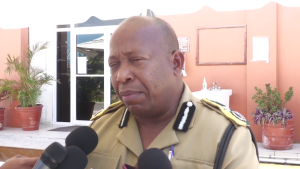
Chester Williams
Chester Williams, Commissioner of Police (File: April 11th, 2025)
“Under the law, the offense of the offense of cruelty to animal carries a imprisonment term of six months. And there is no provision there for a fine. Yes, we know that applying the legal principles that even though a fine is not there, the magistrate at trial if found guilty can still impose a fine or they can go at a custodial sentence depending on how they see the evidence and the different submissions that the different parties may make at that particular juncture.”
Animal abuse has become normalized in Belizean society. While most people don’t see themselves as abusers, many ignore the instances of cruelty happening around them every day. Dr. Jane Crawford, a veterinarian with nearly thirty years of experience, has treated dozens of animals hurt by humans.
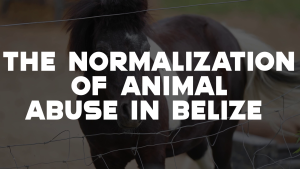 The Normalization of Animal Abuse in Belize
The Normalization of Animal Abuse in Belize
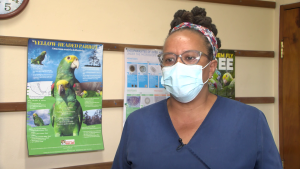
Jane Crawford
Dr. Jane Crawford, Veterinarian, Animal Medical Center
“During my time working as a vet, we have had animals come in that were maybe chopped by machette. Maybe the neighbor has a grievance against a neighbor and they will take it out on the animal. So we would see quite a few cases of that. And I think we have to also know that cruelty is not only physical abuse, it’s also neglect that you just, you have your animal chain all the time and you don’t feed it on time. So all of that plays a part in in cruelty to animals.”
Crawford has seen a decline in severe cases of animal cruelty. However, every case is still heartbreaking to witness.
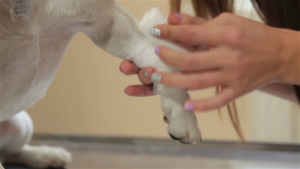 Dr. Jane Crawford
Dr. Jane Crawford
“We get animals that they have been thrown hot water on them. I had one particular case where somebody had forced the dog to eat a hot boiled egg. And so we got burns all inside the mouth and we get animals that are just thrown away. And then just kicked and hit. So you get fractures and broken bones and all of that.”
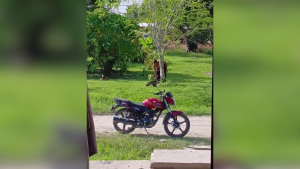 Across the country, several organizations are championing animal rights. These groups are made up of volunteers like Odessa Solis, who have devoted their lives to rehoming injured animals and strays and raising awareness about proper animal care. Solis believes the problem with many Belizeans is that they see animals as property, rather than living beings with needs and feelings.
Across the country, several organizations are championing animal rights. These groups are made up of volunteers like Odessa Solis, who have devoted their lives to rehoming injured animals and strays and raising awareness about proper animal care. Solis believes the problem with many Belizeans is that they see animals as property, rather than living beings with needs and feelings.
Belizeans Step up to the Plate for Animal Rights
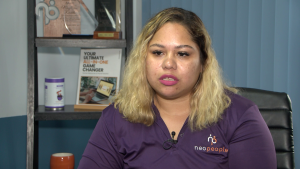
Odessa Solis
Odessa Solis, Animal Rescue Volunteer
“It’s been a hardship for us to experience now growing up in our community, looking at the neglect that the animals are going through and the abuse. And basically what I do to contribute to my community. I work along with my mom where she lives, there’s so many animals on the streets that are neglected and abused, and what we do is provide just a home, provide meals, water, any medical help and just basically assist them with whatever needs they need.”
 Sheltering and feeding the fifteen animals currently under their care has become a costly endeavor for Solis and her mother, but they continue to reach out to the public for support as they attempt to rehome them. A tough part of the job is assisting animals that come from abusive or neglectful homes.
Sheltering and feeding the fifteen animals currently under their care has become a costly endeavor for Solis and her mother, but they continue to reach out to the public for support as they attempt to rehome them. A tough part of the job is assisting animals that come from abusive or neglectful homes.
Odessa Solis
“Animals that are treated really badly do come with their downside, right? However, being the kind of person that me and my mom are, we’re very patient. We try to put ourselves in those situations to understand, you know?”
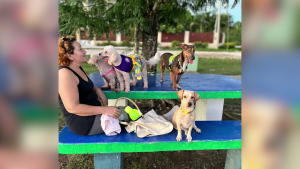 In the recent horse abuse case, the Belize Agricultural Health Authority (BAHA) stepped in to treat the injured animal. Zoe Roberson Zetina, BAHA’s Managing Director, emphasizes that BAHA advocates for the humane treatment of all animals, whether they are pets or work animals.
In the recent horse abuse case, the Belize Agricultural Health Authority (BAHA) stepped in to treat the injured animal. Zoe Roberson Zetina, BAHA’s Managing Director, emphasizes that BAHA advocates for the humane treatment of all animals, whether they are pets or work animals.
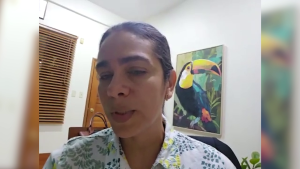
Zoe Roberson Zetina
Zoe Roberson Zetina, Managing Director, BAHA
“We always believe in the humane treatment of animals, and so this is definitely something that we condemn and we condemn it in all its forms. We do take keen interest in animal welfare, but that is a component of BAHA that we have not properly developed. So there are different animal humane society and different agencies that look after this type of thing in a more detailed way than, BAHA does, but there is a component of animal welfare that we monitor and we condemn the actions. So that is a big part of why we will respond to all injuries that are reported to BAHA.”
Dealing with animals can be frustrating, and this often leads people to act violently. However, Dr. Jane Crawford advises pet owners to step away from the situation and return once they’ve calmed down. Odessa Solis explains that she will continue to help neglected or abused animals, but without full support from the public and police, there’s only so much she and other volunteers can do.
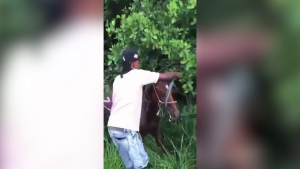 Ending Animal Cruelty in Belize
Ending Animal Cruelty in Belize
Odessa Solis
“I feel like those people that do these awful things they really have some issues to deal with. They need help personally. But at the same time, I would like for the government or even the police department to be aware that you do have citizens that need that help, that support from you guys because it’s sometimes it’s very hard to go to some neighborhoods and try to fight for these animals. And these people are very resistant to the assistance.”
Many animal rights activists hope that by continuing their efforts and speaking out, Belize will strengthen its penalties for animal cruelty and reduce the daily instances of abuse. Britney Gordon for News Five.







Facebook Comments